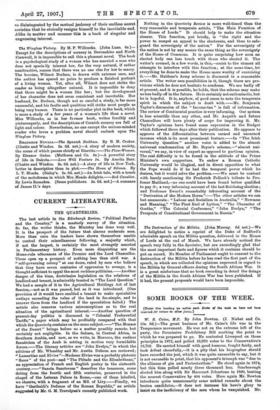CURRENT LITERATURE.
THE QUARTERLIES.
The last article in the Edinburgh Review, "Political Parties and the Country," is a masterly survey of the situation. So far, the writer thinks, the Ministry has done very well. It is the prospect of the future that alarms moderate men. More than once the leaders have shown themselves unable to control their miscellaneous following, a majority which, if not the largest, is certainly the most strangely assorted in Parliamentary history. Even more disquieting are the Home-rule utterances of the Premier and the Lord Chancellor. These open up a prospect of nothing less than civil war. A "self-governing colony" at our doors, ruled by men who believe that they have seven centuries of oppression to avenge, is a thought sufficient to appal the most reckless politician.—Another danger. of the time, doctrinaire legislation on the relations of landlord and tenant, is admirably treated in "The Land Question." We bad a sample of it in the Agricultural Holdings Act of last Session,—not as it was passed, but as it was introduced. (One provision of it would have enabled a tenant to make speculative outlays exceeding the value of the land in fee-simple, and to recover them from the landlord if the speculation failed.) The article also removes various misconceptions as to the real situation of the agricultural interest.—Another question of present-day politics is discussed in " Colonial Preferential Tariffs," a paper which may be profitably compared with that which the Quarterly contains on the same subject.—" The Menace of the Desert" brings before us a matter possibly remote, but certainly not negligible. In the Sahara, in Central Africa, in Southern Arabia, and now, as we write, in Morocco, the restless fanaticism of the Arab is setting in motion very formidable forces.—The literary articles are "John Evelyn," in which the editions of Mr. Wheatley and Mr. Austin Dobson are reviewed; "Lamartine and Elvire"—Madame Elvire was a probably platonic "flame" of the poet—and "The Plelade and the Elizabethans," an appreciation of French and English poetry in the sixteenth century.—`Sancta Sanotorum " describes the treasures, some dating from the fourth and fifth centuries, preserved in the chapel of the Lateran Palace in Rome,—one of them labelled, we observe, with a fragment of an MS. of Livy.—Finally, we have " Garibaldi's Defence of the Roman Republic," an article suggested by Mr. G. M. Trevelyan's recently published work.
Nothing in the Quarterly Review is more well-timed than the• very reasonable and temperate article, "The Main Function of the House of Lords." It should help to make the situation clearer. This function, put briefly, is "the right and the power to compel an appeal to the electorate, and thus to safe- guard the sovereignty of the nation." For the sovereignty of the nation is not by any means the same thing as the sovereignty of the House of Commons. It is quite surprising how soon an elected body can lose touch with those who elected it. The writer's counsel, in a few words, is this,—resist to the utmost all attempts to interfere with this function ; at the same time, let everything be done to make the House more worthy of exercising it. —Mr. Haldane's Army scheme is discussed in a seasonable article. The writer sees possibilities in it, though there are pro- visions which he does not hesitate to condemn. We are badly off at present, and it is possible, he holds, that the scheme may make us less badly off in the future. He is certainly not enthusiastio, but he is hopeful. It is, anyhow, of good omen to note the temperate spirit in which the subject is dealt with.—Mr. Benjamin Taylor's discussion of the " Income-tax " is full of information. The review of Continental practice is very informing. Our system is less scientific than any other, and Mr. Asquith and future Chancellors will have plenty of scope for improving it. Mr. Taylor's opinions have found some expression in the Budget which followed three days after their publication. He appears to approve of the differentiation between earned and unearned incomes which is its most prominent feature.—In "The Irish University Question" another voice is added to the almost universal condemnation of Mr. Bryee's scheme,—" almost uni- versal," we say, in view of expert as opposed to partisan opinion. The real difficulty is to be found in the attitude of the Prime Minister's own supporters. To endow a Roman Catholic University would be illogical, and in direct opposition to what the Pope would do if he had the temporal power which he• desires, but it would solve the problem.—We must be content with barely mentioning Sir Frederick Pollock's tribute to Pro- fessor Maitland,—no one could have been found better qualified to pay it ; a very informing account of the last Reichstag election ; and Professor Ewart's remarkably interesting account of the " Derivation of the Modern Horse."—The other articles we can but enumerate "Labour and Socialism in Australia," "Newman and Manning," "The First Earl of Lytton," "The Character of Goethe," "The Colonial Conference," "John Evelyn," "The Prospects of Constitutional Government in Russia."


























































 Previous page
Previous page